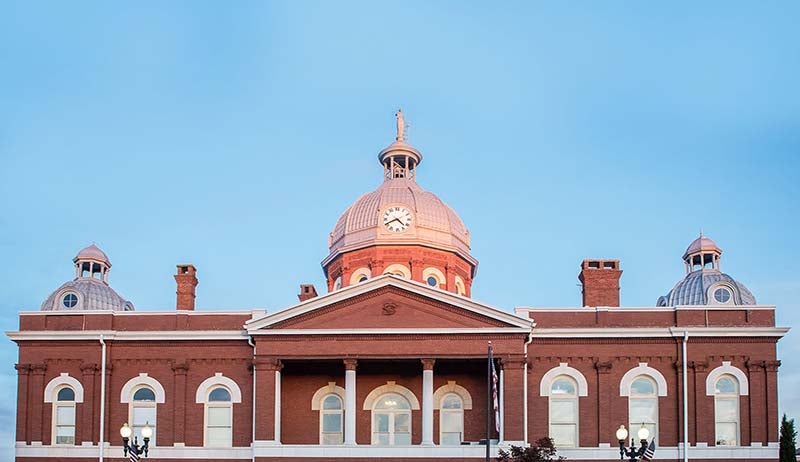Alabama schools to finish year through distance learning; local school systems adjust
Published 5:25 pm Thursday, March 26, 2020
|
Getting your Trinity Audio player ready...
|
MONTGOMERY (AP) — Alabama Gov. Kay Ivey on Thursday directed public schools to finish the academic year with students taking lessons at home through distance learning as the state tries to slow the spread of the coronavirus.
Ivey, who had closed schools through April 5, said it became clear that schools cannot reopen yet. She signed an order saying school systems should implement plans beginning April 6 to finish the school year through alternate means of instruction.
“We must be serious about eliminating the spread of this virus,” Ivey said.
“Folks, this is for real. This is a deadly situation,” she continued.
Alabama Superintendent of Education Eric Mackey said the state is developing plans for how the distance learning would work. Mackey said lessons may be conducted online and students who do not have internet access may get take-home materials.
“We are working with our local superintendents and their teams to make sure there is a plan in place for every school, for every child to continue their learning, to close out their school year,” Ivey said.
Chambers County Superintendent Kelli Hodge said the school system was still seeking guidance from the state and would have more information Friday. However, she did send The Valley Times-News an email she sent to employees.
“Governor Ivey just announced we will not be returning to school this year in a traditional manner,” Hodge said. “We will be responsible for providing instruction to all students in some capacity through the end of the year. Superintendents have a conference call with the state superintendent in the morning. After that call, we will begin developing a plan for how CCSD will serve kids. I’ll get more information to you tomorrow.”
Hodge said the school district is prepared to offer a variety of learning opportunities and understands that many areas of the county do not have reliable internet, so virtual and paper packets will be required.
Lanett Superintendent Jennifer Boyd released a statement to the VTN after Ivey’s announcement.
“During today’s press conference, Dr. Mackey (Alabama State Department of Education) emphasized possible methods of instruction including e-learning/virtual learning, take home packets, etc,” Boyd said. “LCS is exploring which options are better suited to meet the learning needs of our students. Once we have received additional guidance from the Alabama State Department of Education, we will finalize our plans for instruction and ensure that our students and parents are informed.”
The governor’s office said local school districts shall make staffing decisions related to school building access in accordance with all applicable public health orders and the recommendations of the Centers for Disease Control and Prevention and the Alabama Department of Public Health. Ivey, a former teacher, called the distance learning plan, “a wonderful opportunity for you and your children to get a little bit closer.”
“Superintendents are going to be working very closely with you to make sure you and your children have all the materials they need to be successful in their school year,” Ivey said.
The number of coronavirus cases in the state swelled to more than 500 Thursday afternoon, with one confirmed death, according to the Alabama Department of Public Health. State Health Officer Scott Harris said the median age of those infected is 47.
Harris said 8% of known cases were hospitalized— and half of those were in intensive care— but they were getting additional reports from hospitals. The University of Alabama at Birmingham said Thursday that the hospital had 62 patients with coronavirus.
Alabama has ordered all restaurants to end on-site dining, closed public and private beaches, and prohibited non-work gatherings of more than 25 people where people can’t stay 6 feet (2 meters) apart.
Ivey said a shelter-in-place order is not under consideration at this time, citing economic concerns.
“Y’all we are not Louisiana. We are not New York state. We are not California,” Ivey said.
Ivey has faced some criticism over the adequacy of the state’s response.
Alabama Democratic Party Chair Chris England called on Ivey to follow the lead of multiple other states that have issued mandates for people to stay at home and only go out for food, medicine and other essential needs.
Republican Lt. Gov. Will Ainsworth criticized the state’s response to the virus in a letter to the governor’s task force. Ainsworth said some projections show the state could swiftly run out of intensive care beds, hospitals bed and ventilators.
“A tsunami of hospital patients is likely to fall upon Alabama in the not too distant future, and it is my opinion that this task force and the state are not taking a realistic view of the numbers or adequately preparing for what awaits us,” Ainsworth wrote.
Gina Maiola, spokeswoman for Ivey, responded that the governor and state health officials are “working diligently to implement strong statewide policies that will protect the people of Alabama, while allowing them to continue their daily lives as much as possible,”
Some cities are going further than the state.
Birmingham on Tuesday approved a “shelter-in-place” ordinance through April 3, directing people to stay inside unless going out for food, medicine, exercise or essential services. Health officials in Jefferson County, where Birmingham is located, has ordered the closure of nonessential businesses.
The city of Tuscaloosa said it would institute a 10 p.m. to 5 a.m. curfew beginning Friday.
Alabama lawmakers intended to take a break in the ongoing legislative session, with a tentative plan to return on April 28.
For most people, the new coronavirus causes mild or moderate symptoms, such as fever and cough that clear up in two to three weeks. For some, especially older adults and people with existing health problems, it can cause more severe illness, including pneumonia and death.




